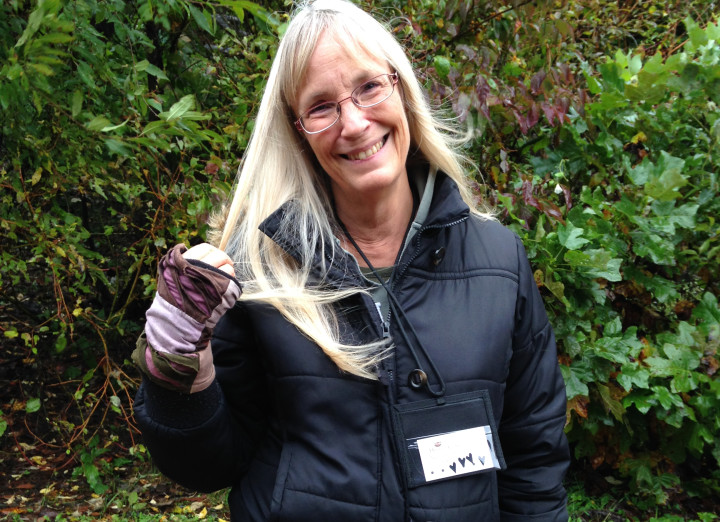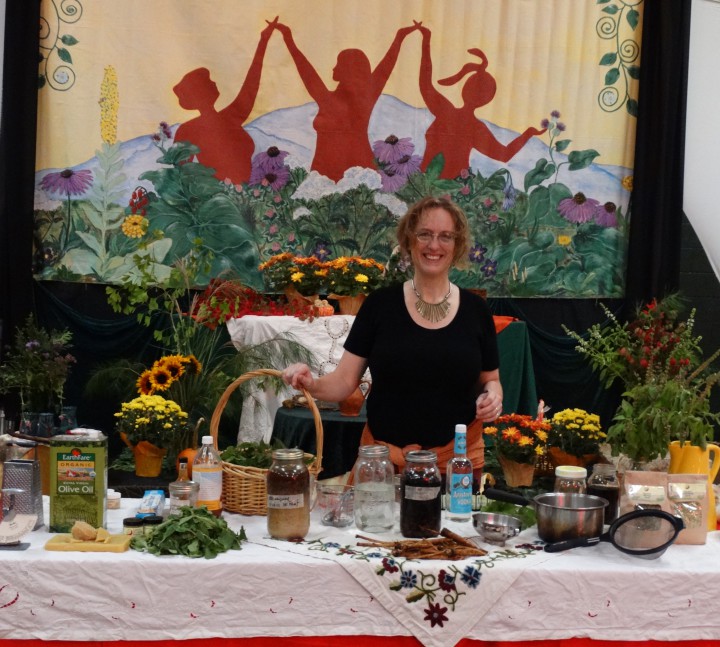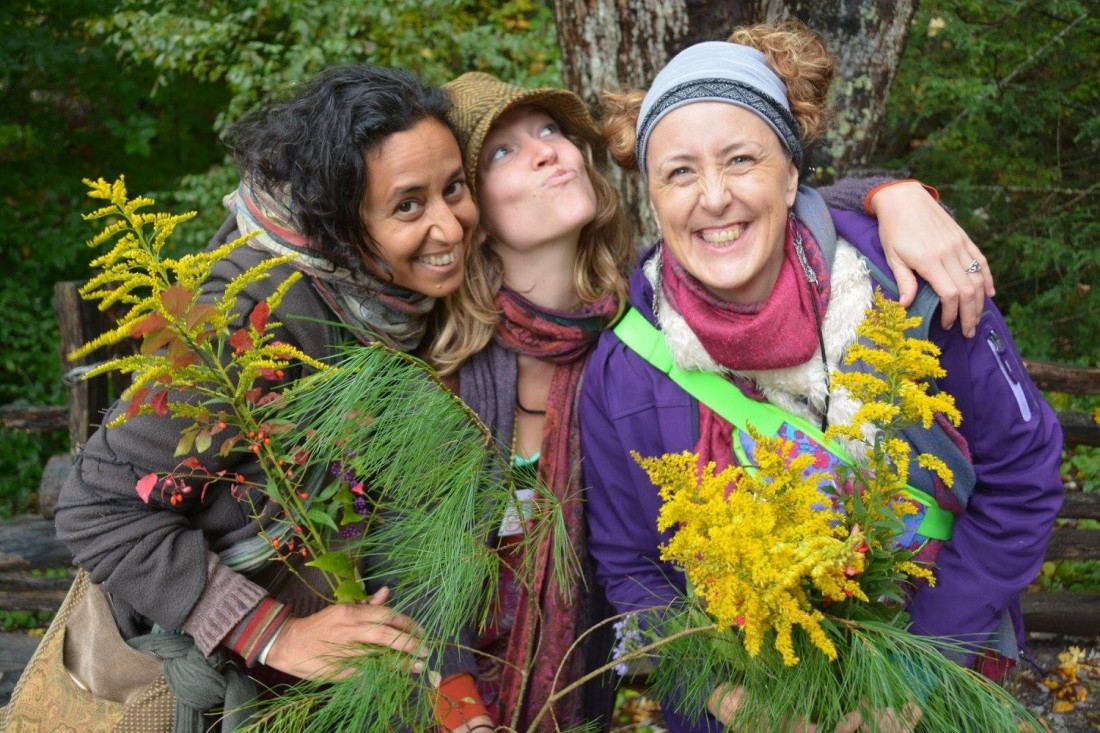Hurricane Joaquin’s squalls blustered through Western North Carolina the first weekend of October, but neither torrential rain, tree-downing winds nor flooding tent floors could diminish the resolve of the more than 1,000 women who converged on Camp Rockmont in Black Mountain for the 11th annual Southeast Wise Women Herbal Conference.
Women of diverse ages, races, interests and ethnicities came to the conference, held Oct. 2-4. They hailed from points across Western North Carolina, the Southeast and beyond. Like Tiffany Boyd of Swannanoa and Allison Dains of Asheville, many women return year after year, making the conference the highlight of their annual calendar.
Dressed in a winter parka, sporting waterproof gloves and knee-high rubber boots, Ashevillean Danielle Creeksong attended the conference for the first time, both as a presenter and a participant. “This conference is the single most self-empowering event I’ve ever attended,” she says.

Although the focus of the conference is herbal healing, the program is so broad, says Boyd, “that there’s something for everyone. It’s a safe space for women. Women make strong connections here, bonding, weaving the web of women. It’s empowering because it reminds us of our strength — emotional, mental, physical and spiritual. It reminds us of our power to influence the world around us.”
Dains concurs. “I come here to recharge my batteries,” she says. “I look forward to this conference every year. I feel empowered as a person, as a woman. My confidence, self-worth and strength make it clear that it’s my choice how I share my energy.”
Honoring the grandmothers was the unifying intention this year according to conference founder and director Corinna Wood. “The 2015 classes included themes honoring the traditional earth-based and herbal wisdom of women from Latin America and Africa to the Appalachians; from the slavery era to the women’s movements,” she says. Wood is co-founder of Red Moon Herbs and a longtime resident of Earthaven Ecovillage south of Black Mountain.
“In honoring the grandmothers,” she continues, “we acknowledge the rich heritage of women of many colors and ethnicities … represented among us as we continue to build our capacity as a community for important and timely dialogue and understanding about healing racism.”
Dismantling racism was the subject of “Sisters of Many Colors: Cultivating Racial Equity,” a discussion panel that opened the conference on Oct. 2. Led by Amikaeyla Gaston, the panelists included Southeast Wise Women program team leader Kifu Faruq. “It was powerful,” says conference event coordinator Ema Carmona.
Workshops such as “Story Medicine Racial Healing Circle” with Asheville’s Meta Commerse and “Healing Historical Trauma” continued the dialogue. In “Herbs, Slavery and the South,” Angelique Moss-Greer shared herbal wisdom preserved by enslaved Africans and passed down to her through five generations of grandmothers. In addition to treating injuries and diseases, herbal knowledge allowed some enslaved women, raped by their white masters, to terminate pregnancy.
Of the more than 60 workshops, the majority — like “Herbs for Cardiovascular Health,” “Nurturing Your Thyroid” and “21st Century Gut Health” with Black Mountain’s Rebecca Word — offered in-depth presentations on herbal medicine, many of them qualifying as continuing education courses for nurses.
Other sessions focused on another aspect of women’s well-being —“Your Sexual Essence,” “Erosology” and “Not Your Mother’s Sex Ed” with Asheville’s Whapio Diane Bartlett.
Some workshops — “Lesbian Herstory in the South,” “Granny’s Scots-Irish Herbal Tradition” with Byron Ballard and “Women’s Movements That Got Us Here” with Kim Duckett — blended history with herbal lore.
“Introduction to Flower Essences,” “Journey with the Elements” and Creeksong’s “Befriending Nature Spirits” engaged women with the energetic intelligences that inform the healing power of plants.
Creeksong relates her experience of the conference this way: “In and of themselves, herbs are an incredible tool for taking charge of our own health, and there were a bevy of workshops related to growing and using herbs.”
Whapio presented “rarely discussed information on female anatomy, our entire glandular system and orgasm,” Creeksong adds. And Jessica Godino’s “Strong is the New Sexy” workshop “provided fascinating scientific research on the misunderstandings, as well as new understandings, of dieting and exercise, helping everyone grasp that exercising is about way more than just losing weight or building bones. Indeed, it is life-preserving and enhancing on all levels. Her class gave me the push I needed to gladly commit to making exercise a priority.”

The Wise Woman Tradition, as Wood explained in a workshop by the same name, differs from a conventional scientific approach, which views the body as a machine and positions the healer as a “mechanic.” It also differs from a heroic approach, which sets the healer up as a “savior.” In contrast to these paradigms, said Wood, the Wise Woman Tradition recognizes the healer as she who invokes compassion and self-love in the process of returning herself to wholeness.
As Wood explained in the workshop, one way to practice the tradition is learning to work with abundantly available local herbs — edible and medicinal plants such as nettles, chickweed and plantain. Another practice is deeply nourishing ourselves with traditional foods, including fermented foods such as pickles, sauerkraut and kimchi. A third, she said, is loving ourselves ever more fully, body and soul, building sacred relationships with plants, the sisterhood of women and the earth itself.
Asked later how the herbal conference points to possibilities for cultural renewal, Wood replies: “When we gather together as women, we connect and celebrate our commonalities as well as our differences. In the Wise Woman Tradition, we move toward a partnership culture that values women and men equally. These all-women classes offer a special opportunity to gain wisdom specific to women’s health and well-being.”
The current dominant culture, she observes, tends to devalue and disrespect women. The Wise Woman Tradition suggests an evolution: “We’re cultivating a culture in which we value and honor and respect ourselves and one another.”
Transitioning to a culture that thoroughly esteems women and girls signifies an elemental change, one more powerful — and more regenerating — than any hurricane.
More Info
Southeast Wise Women Herbal Conference
sewisewomen.com
Danielle Creeksong
daniellecreeksong.com
Meta Commerse
storymedicineasheville.com
Angelique Moss-Greer
naturalchoicesbotanica.com
Rebecca Word
blueridgenaturopath.com
Whapio Diane Bartlett
thematrona.com
Byron Ballard
myvillagewitch.com
Kim Duckett
followheartkd@gmail.com
Jessica Godino
fourflameshealing.com




Before you comment
The comments section is here to provide a platform for civil dialogue on the issues we face together as a local community. Xpress is committed to offering this platform for all voices, but when the tone of the discussion gets nasty or strays off topic, we believe many people choose not to participate. Xpress editors are determined to moderate comments to ensure a constructive interchange is maintained. All comments judged not to be in keeping with the spirit of civil discourse will be removed and repeat violators will be banned. See here for our terms of service. Thank you for being part of this effort to promote respectful discussion.